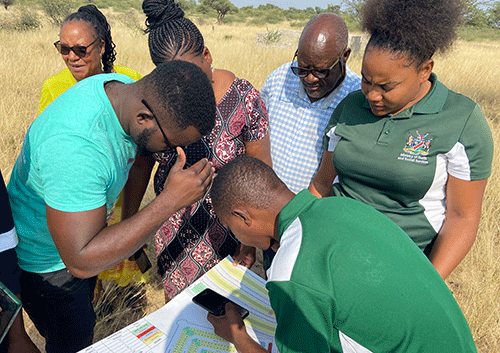ONGWEDIVA – Freshly out of university with an Honours Degree in Land Administration, Sakaria Namhindo made it his life’s purpose to reduce the growth of informal settlements in Okakarara and Otjiwarongo in the Otjozondjupa region.
The 26-year-old currently works as regional area coordinator, and mostly services a Namibian non-profitable organisation, Development Workshop Namibia (DWN). “We have several programmes, but we focus on low-cost land for housing, and mostly work in disadvantaged communities in the two towns,” he said.
Namhindo noted that the focus of DWN is mainly the informal settlement areas, and the disadvantaged low to middle-income- earners in the towns of Okakarara and Otjiwarongo. The overall goal under the DWN programme is to support national development goals.
“We started with the two projects, with the first one established last March in Okakarara and the one in Otjiwarongo at the beginning of the year. We work through local authorities, and are normally supported by the Namibian Chamber of Environment and numerous other donors,” he added.
He thus made it his mission to target low-income-earners because he believes they are neglected when it comes to providing land or plots for housing purposes. The DWN programme aims to cater for less advantaged communities, and to help reduce the growth of informal settlements.
The DWN signs a memorandum of understanding with local authorities for land servicing, while the local authority provides DWN with the land.
“The servicing costs are normally calculated, and a price per plot established. The clients who are landless are given an opportunity to register, and have 12 to 24 months to pay off the plot. So far, Okakarara has over 707 plots earmarked and Otjiwarongo has 483 plots, with both towns making steady progress. Once the plot is fully paid off, the client is allocated their plot and construction can take place within a year,” noted Namhindo.
In Okakarara and Otjiwarongo, DWN is currently working on four extensions to provide more opportunities to low and middle-income-earners to own residential land. The land under the DWN programme comes with minimal services to clients in order to reduce costs, and for the average Namibian to own land.
“For Otjiwarongo, the aim of extensions is to cater for the long municipal waiting list,” he said.
Besides being an area coordinator, Namhindo helps run other programmes under DWN such as housing for all, urban sanitation, early childhood development and urban infrastructure, which are aimed to service low-cost residential land and provide improved sanitation to communities.



